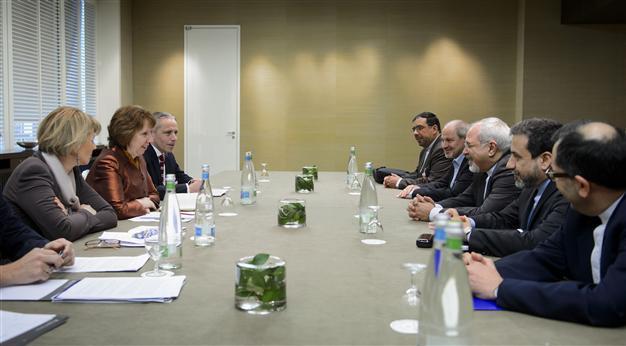Kerry arrives in Geneva as Iran nuclear deal comes into sight
GENEVA – Reuters

EU foreign policy chief Catherine Ashton (2nd L) and Iranian Foreign Minister Mohammad Javad Zarif (3rd R) attend talks over Iran's nuclear programme in Geneva on Nov. 22. AFP photo
U.S. Secretary of State John Kerry arrived in Geneva on Nov. 23 to join talks on Iran's contested nuclear programme, as Tehran and six world powers appeared to be on the verge of a breakthrough in the decade-old dispute.The Chinese, French, British and German foreign ministers - Wang Yi, Laurent Fabius, William Hague and Guido Westerwelle - were due along with Kerry to take part in intense negotiations on a deal under which Iran would curb its atomic activity in exchange for some relief from economic sanctions.
The announcements came after diplomats in the Swiss city said a major sticking point in the talks, which began on Wednesday, may have been overcome.
A senior European diplomat told reporters earlier that foreign ministers of the six states would come to Geneva only if there was a deal to sign. "We have made progress, including core issues," the diplomat said.
France's Foreign Minister, who spoke out against a draft deal floated at the November 7-9 negotiating round, appeared guarded on arrival in Geneva early on Nov. 23.
"I hope we can reach a deal, but a solid deal. I am here to work on that," he said. France has consistently taken a tough line over Iran's nuclear programme, helping Paris forge closer ties with Tehran's foes in Israel and the Gulf. However, a French diplomatic source urged caution.
"It's the home stretch, but previous negotiations have taught us to be prudent." Russian Foreign Minister Sergei Lavrov arrived in Geneva on Nov. 22 evening and met Iranian Foreign Minister Mohammad Javad Zarif and EU foreign policy chief Catherine Ashton, a Russian spokeswoman said.
Kerry left for Geneva "with the goal of continuing to help narrow the differences and move closer to an agreement," State Department spokeswoman Jen Psaki said.
The decision was taken after consulting with Ashton, who is coordinating talks with Iran on behalf of the United States, Russia, China, France, Britain and Germany, Psaki said.
Later, deputy State Department spokeswoman Marie Harf said that Kerry decided to travel to Geneva "in light of the progress being made" and with "the hope that an agreement will be reached".
Echoing optimism that a deal was close, China's state-run Xinhua news agency quoted a foreign ministry spokesman as saying the talks "have reached the final moment". The country's foreign minister left Beijing for Geneva early on Nov. 23.
Diplomats said a compromise over Iran's insistence that its "right" to enrich uranium be internationally recognised has been proposed, possibly opening the way to a long-sought breakthrough.
The United States and other Western powers say there is no such thing as a right to enrich - a process that can yield both electricity and nuclear bombs - but Iran views it as a matter of national sovereignty and crucial to any deal that would resolve the standoff over its nuclear intentions.
The Islamic Republic also wants relief from economic sanctions in return for any nuclear concessions it makes that could allay the West's suspicions that its nuclear fuel-making programme has military rather than its stated civilian goals.
Devil in the details
In the days running up to the talks, policymakers from the six powers said an interim accord on confidence-building steps could be within reach to start a cautious process of detente with Iran and banish the spectre of a wider Middle East war.
Under discussion is Iranian suspension of some sensitive nuclear activities, above all medium-level uranium enrichment. Sanctions relief offered in return could involve releasing some Iranian funds frozen in foreign bank accounts and allowing trade in precious metals, petrochemicals and aircraft parts.
The United States might also agree to relax pressure on other countries not to buy Iranian oil. Tehran has made clear it wants more significant diluting of the sanctions blocking its oil exports and its use of the international banking system.
Diplomacy on Tehran's nuclear aspirations has revived remarkably since the election of Hassan Rouhani, a relative moderate, as president in June on promises of winning sanctions relief and diminishing Iran's international isolation.
The sides have struggled to wrap up a deal, however, bogged down in politically vexed details and hampered by long-standing mutual mistrust.
In Geneva, last-minute discussions wrapped up around midnight on Nov. 23as diplomats from the six powers, the EU and Iran sought to work out an agreement.
Diplomats said new, compromise language being discussed did not explicitly recognise a right to produce nuclear fuel by any country. "If you speak about the right to a peaceful nuclear programme, that's open to interpretation," a diplomat told Reuters without elaborating.
No other details were available, but Zarif, Tehran's chief negotiator, said earlier in the day that significant headway had been made even though three or four "differences" remained.
The fate of Iran's Arak heavy-water reactor project - a potential source of an alternative bomb material, plutonium - and the extent of sanctions relief were among the other stumbling blocks, diplomats said.
Iran rejects suspicions it is covertly trying to develop the means to produce nuclear weapons, saying it is stockpiling nuclear material for future atomic power plants.
















